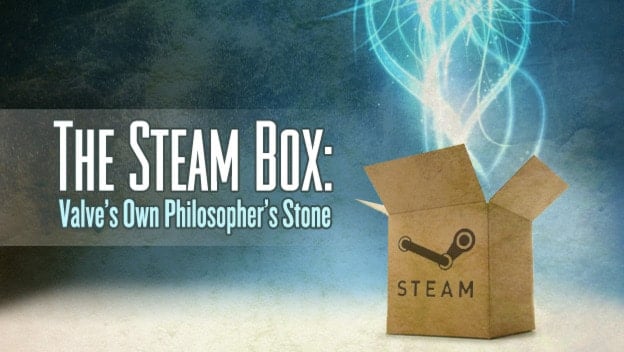The Philosopher’s Stone, in fiction, grants amazing alchemic abilities; it gives the owner the capability to turn lead into gold. Although the Philosopher’s Stone rests only in fantasy, Valve’s Steam Box aims to be its digital equivalent. The Steam Box will be the catalyst by which gamers can turn the lead of the traditional methods of gaming to the gold of Valve’s interactive, fluid digital world.
Valve thrives as a company of alchemists. They take common elements that can be found anywhere in the gaming world and transform them into something much better. The much beloved Half-Life has its roots in the game Quake, for example. But Valve took the ingredients that composed Quake and evolved it. In an interview with The Verge, Gabe Newell referenced Quake as something of a raw material on which to build: “In Quake, you shot a wall and the wall basically ignored you. You saw a little puff, and then there’s no record of your actions. So we said… if you shoot a wall it should change.” The Steam Box borrows from this philosophy: If you play a game, it should change.
Structure and Valve separate like oil and water. There are no bosses in Valve. All the employees work on what they want, when they want. Their desks have wheels so they can roll in with the group they feel they can contribute the most value. In a New York Times Interview, an employee of Valve said of Gabe Newell, “I think he’s technically the C.E.O., but it’s funny that I’m not even sure of that.” This baffled employee highlights the structure less environment Valve values. This abhorrence of structure allows Valve to perform the alchemic miracles they do.
A list of Valve’s alchemic masterpieces includes Half-Life, Team Fortress: Classic and Team Fortress 2, and the various incarnations of Counter-Strike. None of these games could exist without a game that came before. That so much of Valve’s success comes from transforming materials already made can help us understand what they hope to accomplish by the release of the Steam Box. They want to create a device that allows all gamers to practice in the alchemic art of modification they cherish.
Valve has already made steps in this direction with Steam Workshop. The Steam Workshop provides PC gamers with the tools to modify specific games. Gabe Newell called the Steam Workshop “a tool” for content developers and producers. By calling it a tool, Newell confirms that he wants Steam to be more than just a place to buy games. He wants it to be a place for people to share their own alchemic talents.
But Valve’s alchemic ambitions extend far beyond just modifying software. With the Steam Box, they aim to modify the console. In the beginning of his D.I.C.E Summit speech, Gabe Newell said, “There’s going to be a fairly specific sea-change in what we think a game is.” With the impending release of the Steam Box, there’s reason to believe that Gabe had consoles in mind when he said this. Valve wants to undo the console monopoly on living room gaming. More than that, though, the company wants to revolutionize the way games are monetized.
A few user content creators make hundreds of thousands of dollars selling their stuff on Steam Workshop. Gabe Newell makes it a point to comment how Valve can keep up with the major publishers of the day but they can’t keep up with the content the users create. There’s something legitimate about a console. If Valve manages to establish the Steam Box as a legitimate console gaming option, the company then legitimizes the potential of the Box.

The revolutionary impact a legitimized Steam Box can have, however, extends far beyond just dicking around on games already created. Through Steam Greenlight, Valve attempted to create a system where good games have a chance to find an audience and distribution. Although Greenlight has a lot of hiccups, Gabe has talked about how he’d like to see something similar but more functional work on the Steam Box. If Valve has their way, they would create a console and a market in one. The effects this would have on a disc-based gaming economy would be tremendous.
Valve wants to transform the lead of the stale gaming world into a golden paradise of creativity using their Steam Box. Whether or not the Steam Box lives in the same fictional world of the Philosopher’s Stone remains to be seen. It really all depends on Valve’s ability to deliver on their vision. In the words of Gabe Newell (courtesy of The Verge’s interview): “If you do something that is cool, that’s actually worth people’s time, then they’ll adopt it. If you do something that’s not cool and sucks, you can spend as many marketing dollars as you want, [they] just won’t.” Good luck, Valve.
| By Justin Cloyd Freelance Writer Date: March 15, 2013 |
